The Iliad (Penguin Classics) Read online
Page 31
‘Yes, Zeus gave us Pylians a great victory there. We chased them across open country, killing the men and gathering up their splendid armour, till our chariots were rolling through the corn lands of Buprasion and we reached the Olenian Rock and the place called Alesion Hill. At that point Athene turned our forces back, and there I killed and left my last man. Our chariot- (760) eers withdrew from Buprasion and drove back to Pylos, all of them giving glory to Zeus among the gods and to Nestor among men.
‘That was me, in my day – long ago as it all was. By comparison, Achilles is the only one who is going to get any advantage from his brilliance in battle – though he will shed many a remorseful tear when it is too late and the army is destroyed.
Patroclus’ father’s advice
‘My dear friend, your father Menoetius gave you instructions that day he sent you from Phthia to join Agamemnon. I and godlike Odysseus were in the house and we heard everything he told you. We had come to Phthia and the welcoming palace of Achilles’ father Peleus to (770) recruit troops from the bountiful land of Achaea. There we found the warrior Menoetius and yourself and Achilles with you. Peleus the old charioteer was burning the fat thighs of an ox in his stable-yard in honour of Zeus who delights in thunder. He had a golden cup in his hand and was pouring a libation of sparkling wine as the sacrifice was burning, while you two were preparing the meat.
‘At that moment, Odysseus and I appeared at the gate. Achilles was amazed and sprang to his feet, took us by the hand, brought us in, told us to sit down and set beside us the (780) food that hospitality requires. When we had satisfied our hunger and thirst, I began to speak, urging you and Achilles to join us. You were more than willing, and your fathers both started giving you advice. While the old man Peleus exhorted his son Achilles always to be the best and excel all others, Menoetius was giving you his own advice: ‘‘My son, Achilles is of nobler birth than you and he is also by far the stronger man. But you are older than he is. It is for you to give him sound advice, make suggestions and give him a lead which he will follow to his own advantage.’’
Nestor suggests Patroclus’ return (16.40)
(790) ‘Those were your old father’s instructions – which you have forgotten. But even so you could still speak to warlike Achilles to see if he will do what you say. Who knows? With some divine help, your suggestions might stir him to change his mind. A friend’s advice is often the most effective. But if he is privately deterred by some prophecy, some word from Zeus that his lady mother has told him, let him at least allow you to take the field with the Myrmidon contingent at your back, if perhaps you might bring salvation to the Greeks. Let him give you his own fine armour to fight in, so that the Trojans take you for him and (800) break off the battle. That would give our weary troops some breathing space – there is little enough respite in war. The Trojans have fought to the point of exhaustion, and you, being fresh, might well drive them back to the town from our ships and huts.’
So he spoke, and his words went straight to Patroclus’ heart. He set off at a run past the line of ships to rejoin Achilles. As he ran past the ships of godlike Odysseus – the place where they held their assemblies, conducted public business and had put up their altars to the gods – Eurypylus met him, limping back from (810) the battle with the wound from an arrow in his thigh. Sweat was pouring from his head and shoulders and dark blood gushed from his painful wound, though his mind was not affected. Strong Patroclus was moved to compassion at the sight and mournfully spoke winged words:
‘Wretched rulers and leaders of the Greeks, so now it seems you were destined to glut the swift dogs of Troy with your white flesh, far from your dear ones and the land of your fathers. But (820) tell me, Eurypylus, is there any hope of holding awe-inspiring Hector in check, or will the Greeks fall to his spear and be destroyed today?’
The wounded Eurypylus replied:
Patroclus tends Eurypylus’ wound
‘Olympian-born Patroclus, there will be no salvation for the Greeks now; they will fall by their own black ships. All our former champions are lying there already, hit by Trojan missiles or stabbed, and all the time the enemy grows stronger. But at least you can take me and see me safe to my black ship, then cut the arrow out from (830) my thigh, wash off the blood with warm water and spread soothing herbs on the wound, the excellent ones you learnt about from Achilles who was taught by Cheiron, most honest of Centaurs. As for our healers Podaleirius and Machaon, I think one of them is lying wounded in camp in need of a good healer himself, while the other is still in the field resisting the Trojans’ frenzied attack.’
The strong son of Menoetius replied:
‘How can we have got into this situation? What are we to do, Eurypylus? I am on my way with a message for warlike Achilles (840) from Gerenian Nestor, guardian of the Greeks. But I’m not going to abandon you in your distress.’
He spoke, put his arm round his waist and supported this shepherd of the people back to his hut. When Eurypylus’ attendant saw him, he spread some hides on the floor, and there Patroclus laid him down, cut the sharp point of the arrow out of his thigh with his knife and washed away the dark blood from the wound with warm water. Then he crushed the root of a bitter herb with his hands and applied it. It was a pain-killer, which promptly did its work. The wound began to dry, and the blood stopped flowing.
12
HECTOR STORMS THE WALL
1–35: The future destruction of the Greek wall by the gods is described.
35–174: The Trojans cannot cross the ditch by chariot, and Polydamas suggests an attack on foot. Hector agrees; Asius’ attempt by chariot fails.
175–250: ZEUS sends an omen – the eagle and the snake. Polydamas says it means the Trojans should retreat; Hector rejects his advice.
251–330: The Trojans storm the Greek wall, and the two Ajaxes stoutly defend. Sarpedon and Glaucus discuss the hero’s duties and attack with their Lycian troops.
3 31 -4 3 5: Ajax son of Telamon and the archer Teucer come to Menes- theus’ aid. Sarpedon tears down part of the Greek wall; Ajax and Teucer repel him.
436–71: ZEUS intervenes, Hector smashes down a gate in the Greek wall and the Greeks turn and run.
While brave Patroclus was attending to the wounded Eurypylus in his hut, general fighting broke out between the Greeks and Trojans. It did not look as though the Greeks’ ditch and the wide wall behind it could hold out much longer.
When the Greeks had built this wall with the ditch alongside to protect their ships, they had failed to make impressive offerings to the gods and so to ensure a safe haven for them and the vast spoils they had taken. The wall was built without the goodwill of the immortal gods, and it did not last for long. (10) While Hector was alive, Achilles angry and lord Priam’s town unsacked, the great Greek wall survived. But later, when all the best of the Trojans were dead and many of the Greeks too (though some survived); when Priam’s town had been sacked in the tenth year of the siege and the Greek expedition had sailed for home; then Poseidon and Apollo decided to destroy the wall by unleashing upon it the force of all the rivers that run down from the range of Mount Ida to the sea.
(50) (The wall’s eventual destruction (7.459)) The names of the rivers were Rhesus, Heptaporus, Caresus, Rhodius, Granicus, Aesepus, divine Scamander and Simoïs, on whose banks many a shield and helmet and many a warrior of that half-divine generation had fallen in the dust. When that day came, Phoebus Apollo brought all these rivers together at one mouth and for nine days he flung their waters at the wall, while Zeus rained without ceasing to submerge it the quicker. Trident in hand, Poseidon the earthshaker himself directed the torrent, washed out to sea all the wooden and stone foundations that 60the Greeks had laid with such labour and levelled the shore of the fast-flowing Hellespont. When the wall had been destroyed, he covered the wide beach once more with sand and turned the rivers back into the channels down which their lovely streams had run before.
All this remained to be done by Poseidon and Apollo in th
e future. At the moment, however, the wall stood solid, and the hue and cry of battle flared up round it, the woodwork of its towers reverberating to the enemy’s missiles. The Greeks, cowed by Zeus’ scourge, were penned in and trapped beside their ships (40) by their fear of Hector, the mighty master of the rout, who was fighting in the front ranks like a hurricane.
As a wild boar or lion twists this way and that among the hounds and huntsmen to defy them in its strength: the men close their ranks, confront it like a wall and pelt it with showers of spears; but there is no fear or thought of flight in the boar’s dauntless heart – its very courage kills it; time and again it turns and tries some new point in the ranks; and wherever it charges, the ranks give way – so Hector went up and down among his 50 men, urging the charioteers to cross the ditch. But not even his own swift horses would cross for him. They were frightened by its width and halted at the brink, neighing shrilly: it was certainly not easy to leap over or cross in any way. Both banks were overhanging along its entire length, and on top there was a row of pointed stakes, close-set and strong, which the Greek troops had planted there to keep out their enemies. So no horses pulling a chariot could easily break through to the other side.
The foot-soldiers, however, were keen to attempt the crossing, (60) and Polydamas went up to daring Hector and said:
Polydamas suggests attacking wall on foot
‘Hector and you other Trojan and allied commanders, it would be unwise to drive our chariots over the ditch. It’s almost impossible to cross: there are the sharp stakes along the edge, and close behind comes the Greek wall, leaving the charioteers no room to dismount and fight – and so narrow a strip that I am certain there would be casualties. If high-thundering Zeus is really on our side, has evil in mind for the Greeks and means to wipe them (70) out, there is nothing I want more than to see them being destroyed here and now, far from Greece, with no trace left. But if they regroup and launch a counter-attack from the ships, and we get entangled in the ditch, I don’t think a single man would escape to bring the news to Ilium. So I suggest we all do what I now propose. Let our attendants hold our horses at the ditch while we, on foot and fully armed, follow Hector in massed formation. The Greeks won’t stand up to us, if their doom really is sealed.’
(80) So spoke Polydamas, and his timely advice seemed excellent to Hector. Fully armed, he immediately leapt from his chariot to the ground, and all the other Trojans abandoned their formation and did the same when they saw Hector dismount. They all left their chariots in their drivers’ charge, with orders to hold their horses in good order there at the ditch. Then, dividing up, they organized themselves into groups and lined up behind their own leaders in five contingents.
The Trojan battle order
Of these, the best and biggest was the one commanded by Hector and matchless Polydamas. None showed greater enthusiasm to breach the wall and (90) fight by the hollow ships. Cebriones, Hector’s charioteer – Hector had replaced him in his chariot with an inferior fighter – was third in command. The second contingent was led by Paris, Alcathous and Agenor; and the third by two of Priam’s sons, Helenus and godlike Deiphobus, with, as third in command, the warrior Asius whose huge, sleek horses had brought him from Arisbe and the River Selleïs. Aeneas, handsome son of Anchises, led the fourth contingent supported by two sons of (100) Antenor, Archelochus and Acamas, men experienced in every kind of fighting. Fifth, Sarpedon commanded the renowned allies, and had appointed under him Glaucus and warlike Asteropaeus, whom he considered beyond question the best men among the allies next to himself, he being the finest warrior of them all. They drew up in close formation, oxhide shields touching, and resolutely advanced on the Greeks, in the confidence that nothing could stop them now from falling on the enemy ships.
Of the Trojans and their famous allies, all except Asius son of Hyrtacus adopted the tactics suggested by admirable Poly- (110) damas. But Asius, commander of men, refused to abandon his chariot and charioteer and decided instead to advance on the ships, chariot and all. He was a fool. He was not destined to evade the evil demons of death and to drive back his chariot and pair in triumph from the ships to windswept Ilium. Before that, in the spear of noble Idomeneus, a hateful fate engulfed him.
Lapiths repel Asius
Asius drove at the left flank of the ships where the Greeks had a crossing that they used when returning from the plain. Here Asius drove his chariot and horses over and, coming to the gateway, found the doors had not been closed nor the long bar slid in place. The defenders were holding them open to give stragglers escaping from the battlefield a chance to reach the ships. So Asius in his chariot made straight for the gate and his contingent followed, yelling shrilly. They thought the Greeks could not stop them now but would be slaughtered beside their ships.
The fools. At the gate they met two champions, proud sons of the warlike Lapith race. One was mighty Polypoetes son of (130) Peirithous, and the other was Leonteus, equal of the murderous War-god Ares. This pair had planted themselves in front of the high gate, like lofty mountain oaks that resist the wind and rain for ever, supported by their long and sturdy roots. So the two, relying on the strength of their arms, awaited the onslaught of great Asius and did not retreat. The Trojans, massing themselves (140) around lord Asius, Adamas his son, Iamenus, Orestes, Thoön and Oenomaus, held up their leather shields and with a mighty shout made straight for the wall.
For a while, the two Lapiths had been encouraging the Greek men-at-arms inside the ramparts to defend their ships from that point. But when they saw the Trojans storming the wall and the Greeks yelling and panicking, they charged right out and fought in front of the gate, like a pair of wild boars in the mountains, facing a noisy mob of men and dogs: they charge with glancing blows, crushing and rooting up the undergrowth around them, (150) noisily clashing their teeth, till at last they are hit by someone’s spear and killed – so the shining bronze on the chests of the Lapiths clashed as it met the enemy’s blows. They put up a mighty defence, trusting in their own strength and in the men on the wall above, who were flinging stones down from the well-built ramparts in defence of their lives, their camp and seafaring ships. Rocks came pelting to the ground like snow flakes in a fierce blizzard which sends the dark clouds scudding and thickly blankets the bountiful earth. So the rocks flew from (160) the hands of Greek and Trojan alike. Helmets and bossed shields rang out harshly as the great boulders hit them.
Then Asius groaned, slapped his thighs and in exasperation spoke out:
‘So, Father Zeus, you are an absolute born liar. I never thought those Greek warriors could withstand our determination and invincible tenacity. But they’re like supple-waisted wasps or bees that build their home by a rocky path and won’t be driven from (170) the hive, but stay and defend their children against the huntsmen – in just the same way those two Greeks want to kill or be killed before they give way from the gate.’
So he spoke, but his words had no effect on Zeus, who had made up his mind to let Hector have the glory. Meanwhile other Trojan contingents had carried the fighting to other gates. But it would be difficult for me to tell the whole story, as if I had the abilities of a god. All along the stone wall fierce fires broke out, and the hard-pressed Greeks were compelled to fight for their (180) very ships. All the gods who had taken their side were in the depths of despair.
The Lapiths kill eightTrojans
But here it was the two Lapiths who now went on the offensive. Peirithous’ son Polypoetes threw his spear and hit Damasus on his bronze-sided helmet. The helmet failed to repel it, and the point smashed right through the bone, spattering all the inside of the helmet with his brains. So he ended Damasus’ assault. Next, he killed Pylon and Ormenus.
Meanwhile Leonteus ally of the War-god flung his spear at (190) Hippomachus and caught him on the belt. Then he drew his sharp sword from its sheath and dashed into the throng, where he closed in on Antiphates and struck him. Antiphates was hurled to the ground flat on his back. Then in swift
succession Leonteus brought Menon, Iamenus and Orestes to the bountiful earth.
While the Lapiths were stripping the shining armour from these men, the young Trojan warriors under Polydamas and Hector, who formed the best and biggest of the contingents and had shown the greatest eagerness to breach the wall and set the ships on fire, were still standing along the ditch, hesitating to (200) advance. The reason was that, just as they were going to cross, a bird of omen had suddenly appeared to them, an eagle flying high across the front of the army from right to left, with a blood-red snake in its talons. This ominous creature was alive and still struggling: it had not let up on its will to fight. Twisting back on itself, it bit its captor on the breast beside the neck. At this the eagle, in agony, released its hold, let the snake drop to the ground among the troops and with a loud cry sailed away down the wind.
The Trojans were appalled when they saw the snake lying there writhing about in their midst, a sign from Zeus who drives 210 the storm-cloud. Polydamas went straight up to daring Hector and said:
‘Hector, as a rule you object when I offer sound advice at our assemblies. It is, of course, entirely unfitting for your humble servant to disagree with you either in the council-chamber or on the battlefield; he must only exalt your authority. But once again I am now going to speak my mind and say what I think best.

 The Odyssey
The Odyssey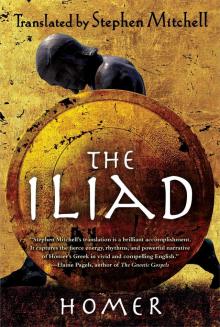 The Iliad
The Iliad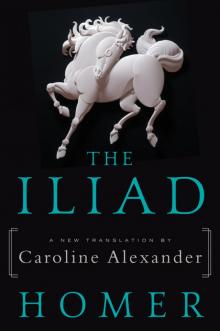 The Iliad (Trans. Caroline Alexander)
The Iliad (Trans. Caroline Alexander)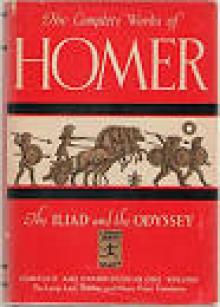 Complete Works of Homer
Complete Works of Homer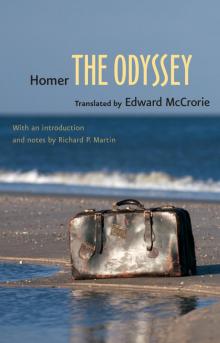 The <I>Odyssey</I>
The <I>Odyssey</I>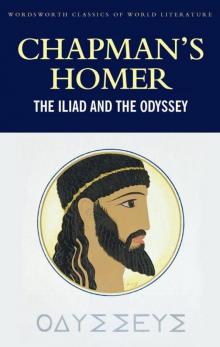 The Iliad and the Odyssey (Classics of World Literature)
The Iliad and the Odyssey (Classics of World Literature)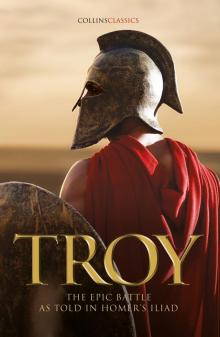 Troy
Troy The Iliad (Penguin Classics)
The Iliad (Penguin Classics)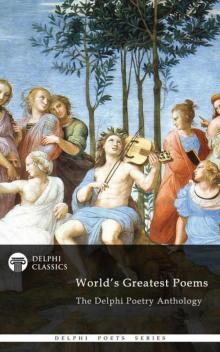 Delphi Poetry Anthology: The World's Greatest Poems (Delphi Poets Series Book 50)
Delphi Poetry Anthology: The World's Greatest Poems (Delphi Poets Series Book 50)